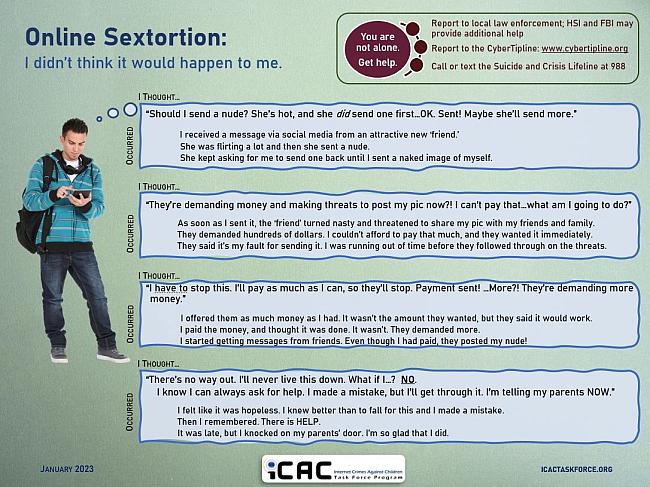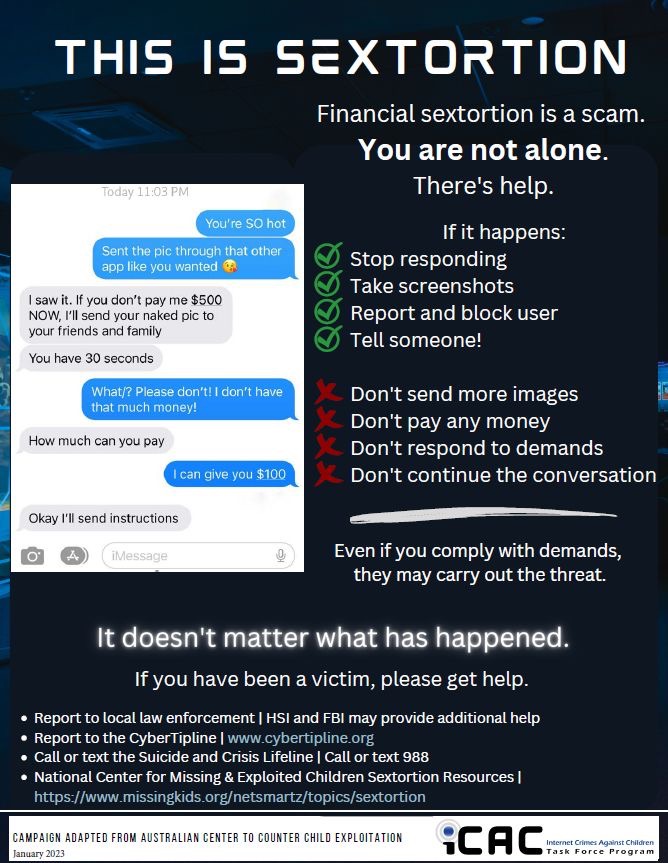 Cell phone users, often teens and "tweens", create provocative and nude, sexual images or videos of themselves using their cell phone's built-in digital camera. Sexting (or "sex texting) is the sharing and receiving of sexually explicit messages and nude or partially nude images via cellphone.
Cell phone users, often teens and "tweens", create provocative and nude, sexual images or videos of themselves using their cell phone's built-in digital camera. Sexting (or "sex texting) is the sharing and receiving of sexually explicit messages and nude or partially nude images via cellphone.
In a recent survey from the National Campaign to Prevent Teen and Unplanned Pregnancy, one out of five teens reported that they have electronically sent or posted online, nude or seminude pictures or videos of themselves. With an estimated 90 to 95 percent of school kids carrying cell phones, this is a trend we cannot afford to ignore.
When teens and tweens engage in this illicit activity, it can lead to serious repercussions. Police are currently investigating teens throughout the country for sending nude images of themselves, with consequences ranging from suspension to felony charges for the creation and distribution of child pornography.
As a parent during the digital age, it can be difficult to enforce boundaries and stay on top of everything your kids are doing, but if you're footing the bill, it is well within your right to ask your children what they are doing and play your part to help protect them.
Key Report Findings:
- Although most teens who send sexually suggestive content are sending it to boyfriends and girlfriends, others say they are sending such material to those they want to hook up with or even to someone they only know online.
- Teens are conflicted about sending/posting sexually suggestive content--they know it's potentially dangerous, yet many do it anyway.
- Teens are sending sexually explicit messages and images, even though they know such content often gets shared with those other than the intended recipient.
- Young people who receive nude/semi-nude images and sexually suggestive texts and emails are sharing them with other people for whom they were never intended.
- Teens admit that sending/posting sexually suggestive content has an impact on their behavior.
5 Tips to Help Parents Protect Kids from Sexting:
- Talk to your kids about what they are doing online and outline the risks. Talk to your kids about sex and relationships in the offline and online world.
- Make sure your kids understand that messages or pictures they send over the Internet or on their cell phones are not truly private or anonymous. Also make sure they know anyone can--and often will--forward their pictures of messages to others. (Ask your daughter what her boyfriend will do with those pictures once they break up). And check up on what your kids are posting online.
- Know who your kids are communicating with online and via cell phones: Do your best to learn who your kids are spending time with online and on the phone by chacking their IM buddy lists, social networking friends and mobile device address/contact list.
- Consider placing limits on electronic communication. Check out the parental controls offered by your mobile provider. Many mobile carriers offer family plans that allow you to limit the amount and type of text messages your kids can send. Also disable attachments on text messages.
- Set expectations: Make sure you are clear with your teen about what you consider appropriate behavior online and through text.
1) Adapted from 'Tech Talk: Sexting', ConsumerReports.org, February 24, 2009 & "Sex & Tech", Five Tips to Help Parents Talk to Their Kids About Sex and Technology, National Campaign to Prevent Teen and Unplanned Pregnancy. See the full "Sex & Tech" report here.
Click here for great tips from ConnectSafely: Tips to Prevent Sexting
Tips from the National Center for Missing and Exploited Children
U.S. Sexting Laws & Regulations
PREVENTING SEXTORTION AMONG YOUTH (ICAC)


 Cell phone users, often teens and "tweens", create provocative and nude, sexual images or videos of themselves using their cell phone's built-in digital camera. Sexting (or "sex texting) is the sharing and receiving of sexually explicit messages and nude or partially nude images via cellphone.
Cell phone users, often teens and "tweens", create provocative and nude, sexual images or videos of themselves using their cell phone's built-in digital camera. Sexting (or "sex texting) is the sharing and receiving of sexually explicit messages and nude or partially nude images via cellphone.
